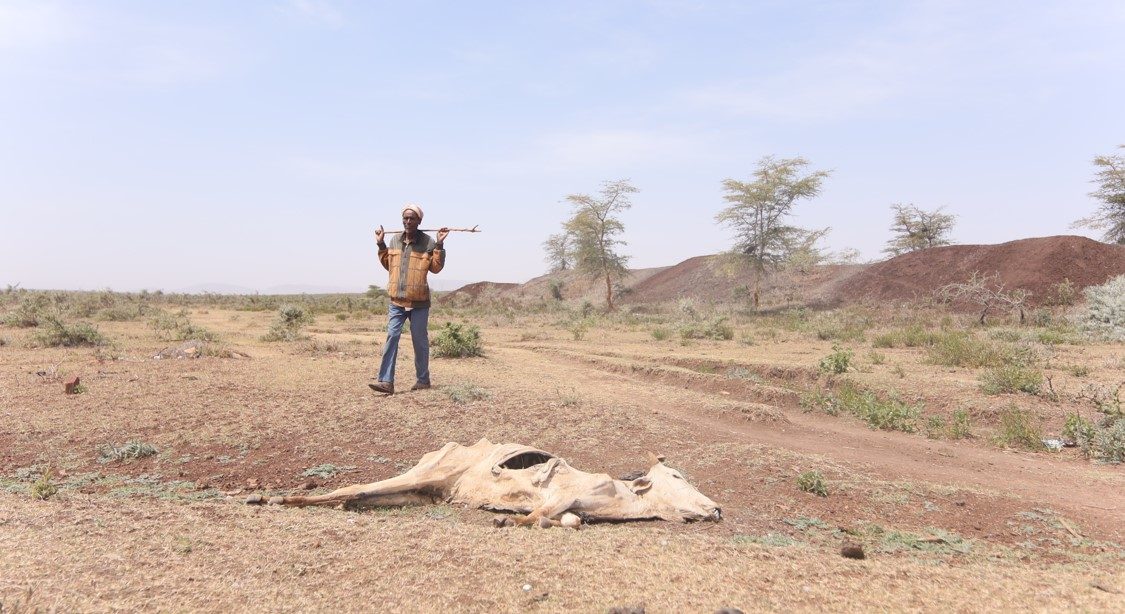As Ethiopia continues to be plagued by severe drought, cattle farmers Kulagalgalo and Durette explain the devastating effect this has had on their families and livelihoods.

Kulagalgalo is in a state of shock and becomes emotional as she explains that her husband is ill in bed. From Borena zone in Oromia, she used to have 81 cows but lost 75 in the course of just 2 days due to the severe drought currently plaguing Ethiopia. She struggles to comprehend what has happened to her family as she looks at the carcasses of her cattle. “I have never experienced such a drought as this in my whole lifetime,” she says.
With a large family of 12 to take care of, Kulagalgalo has 9 daughters and one son. Five of her daughters are married, but the rest of her children are at home and unable to attend school due to lack of food at school and home. “Before the drought, we were happy managing our herd of cattle which were our pride and joy. We made a good living,” she explains.
Impact of the drought
Three consecutive failed rainy seasons in Ethiopia have decimated crops and caused abnormally high livestock deaths. The situation has worsened still further over the past few months when the much-hoped-for short rainy season failed to arrive, leaving cattle without enough pastureland or water to survive.
“Cash is better than other forms of help, such as food distributions as I can use it to cover all my primary needs.”
Kulagalgalo
Livestock farmer Durette tells us how he travelled with his herd of cattle in search of green pasture and water, but had to watch as all 108 of his cows died in one day. “Their carcasses were everywhere with vultures fighting for the best pieces of meat accompanied by foul stink which hung in the air.”
Many people in Borena are only eating once or twice a day if they are lucky. The drought has caused widespread soil degradation and pasture depletion so thousands of pastoralists have been forced to take their livestock to far-flung locations in search of green pasture and water.
Zonal authorities have reported more than 6.8 million people have been affected in 26 zones across Ethiopia and 260,000 livestock have died.
Our response
Plan International has identified the key needs in the region are food, livestock and animal feed, closely followed by education and menstrual hygiene for girls.
The organisation is currently conducting a feasibility assessment for cash and voucher assistance through a multisector market approach. Discussions are ongoing with key stakeholders including government authorities, financial service providers and communities through focus group discussions.
Plan International is also responding with health and veterinary support as part of our immediate response.
Cash supports families
Cash and voucher assistance is increasingly becoming one of the preferred methods of responding to emergencies as part of our social safety net programmes. Kulagalgalo is one of those who has been selected to receive a cash transfer and has already planned how she will spend the money.
“I will buy some good food for us to eat at home as a family. I want to send my children to school, treat my husband and buy some new cattle. Cash is better than other forms of help, such as food distributions as I can use it to cover all my primary needs,” Kulagalgalo explains.
Plan International has reached nearly 400,000 people in Ethiopia with cash transfers since 2013, distributing more than €2.5 million. Globally, we have distributed €140 Million in 33 countries.
“I want to see cash and voucher assistance as a space for expansion and innovation that makes the right holders masters of their own destiny,” says Mudasser Siddiqui, Country Director for Plan International in Ethiopia.


